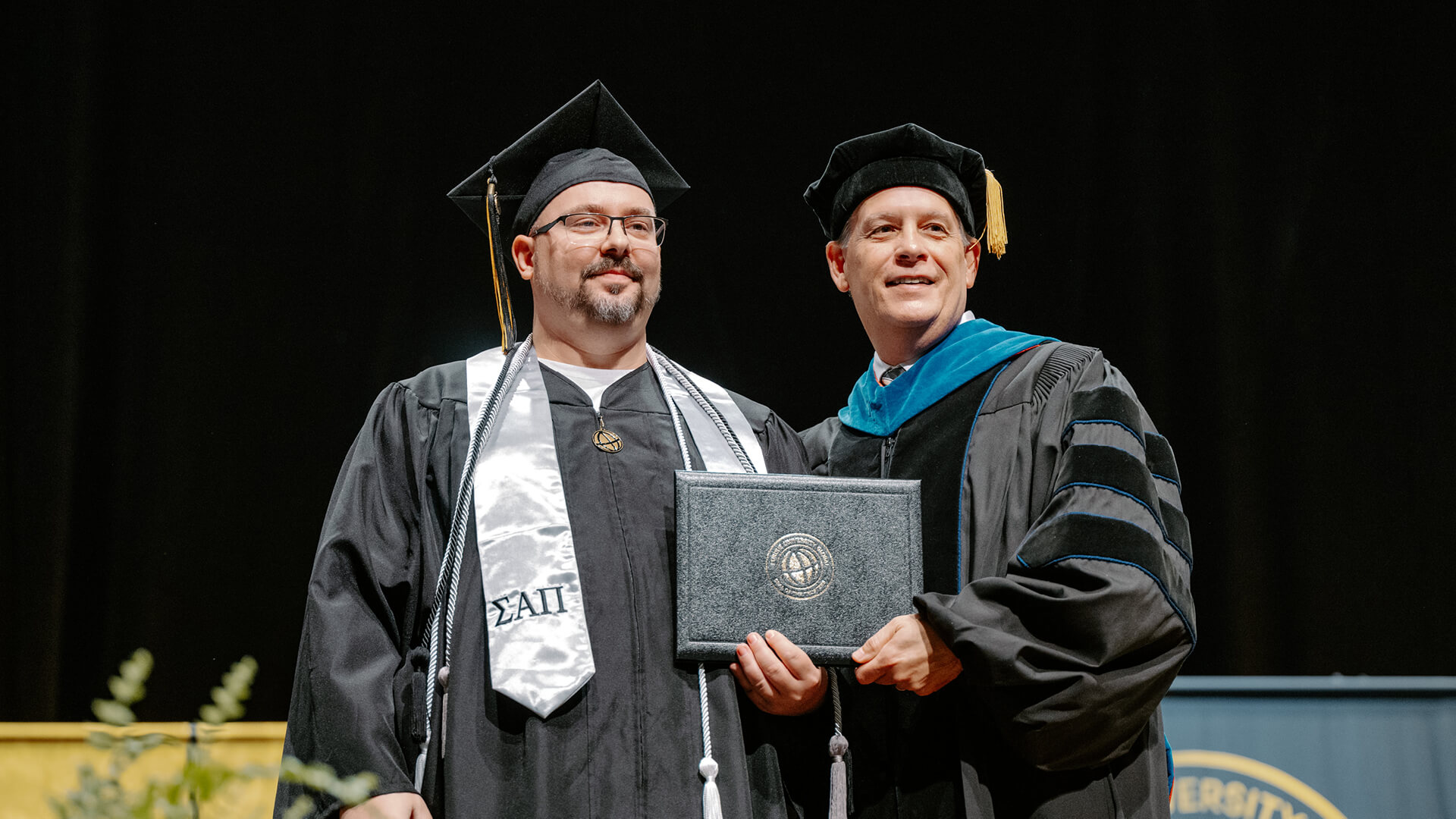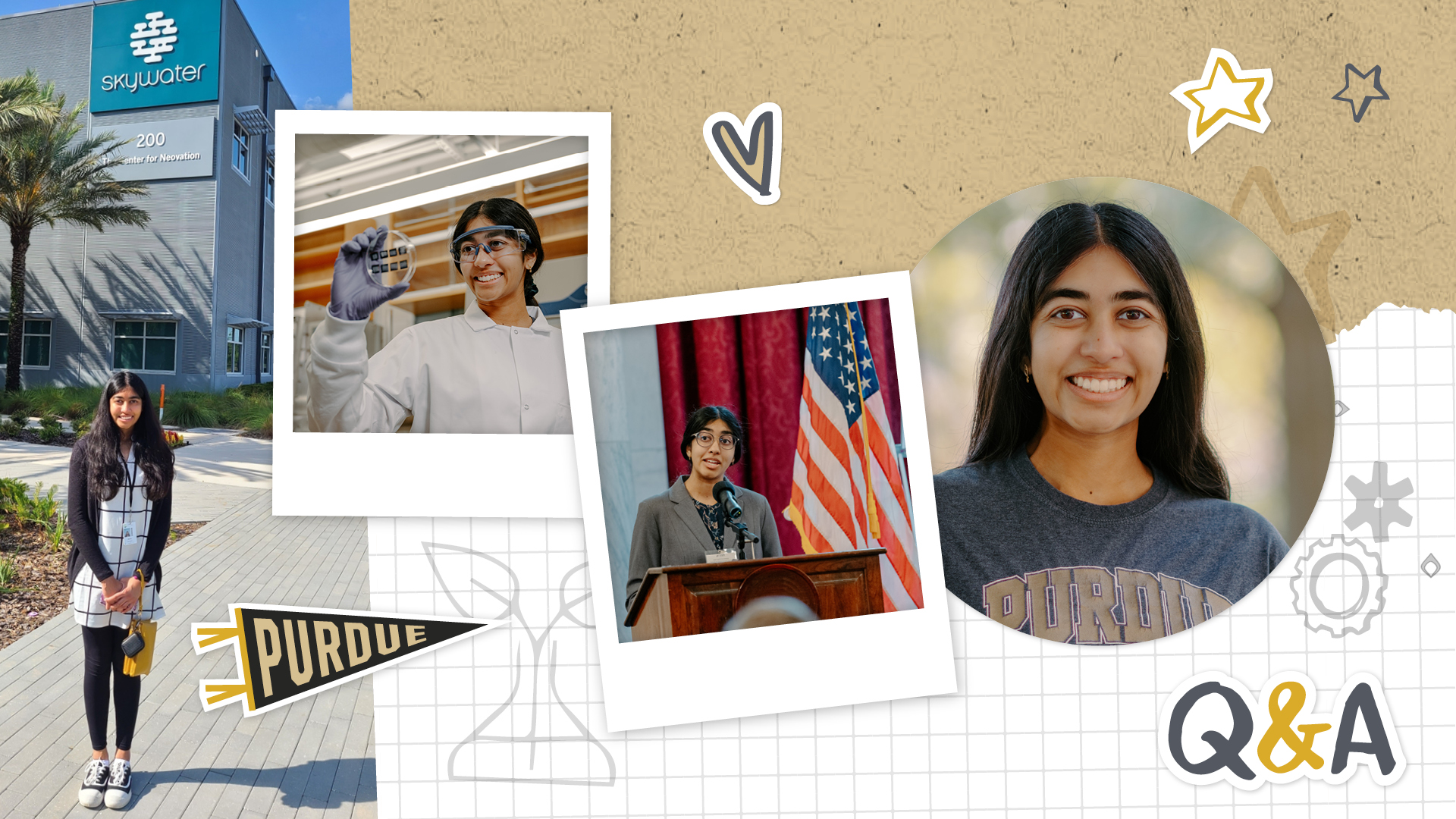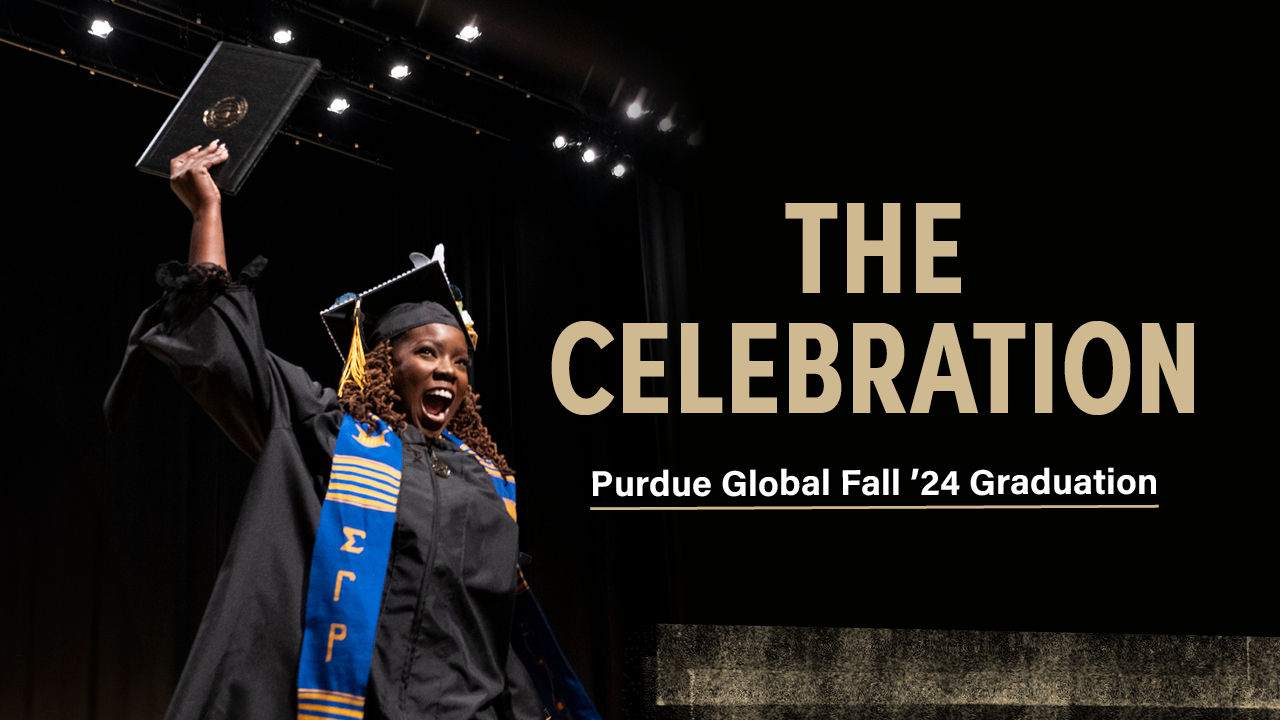Purdue University Online grad uses education to improve lives of prosthesis users
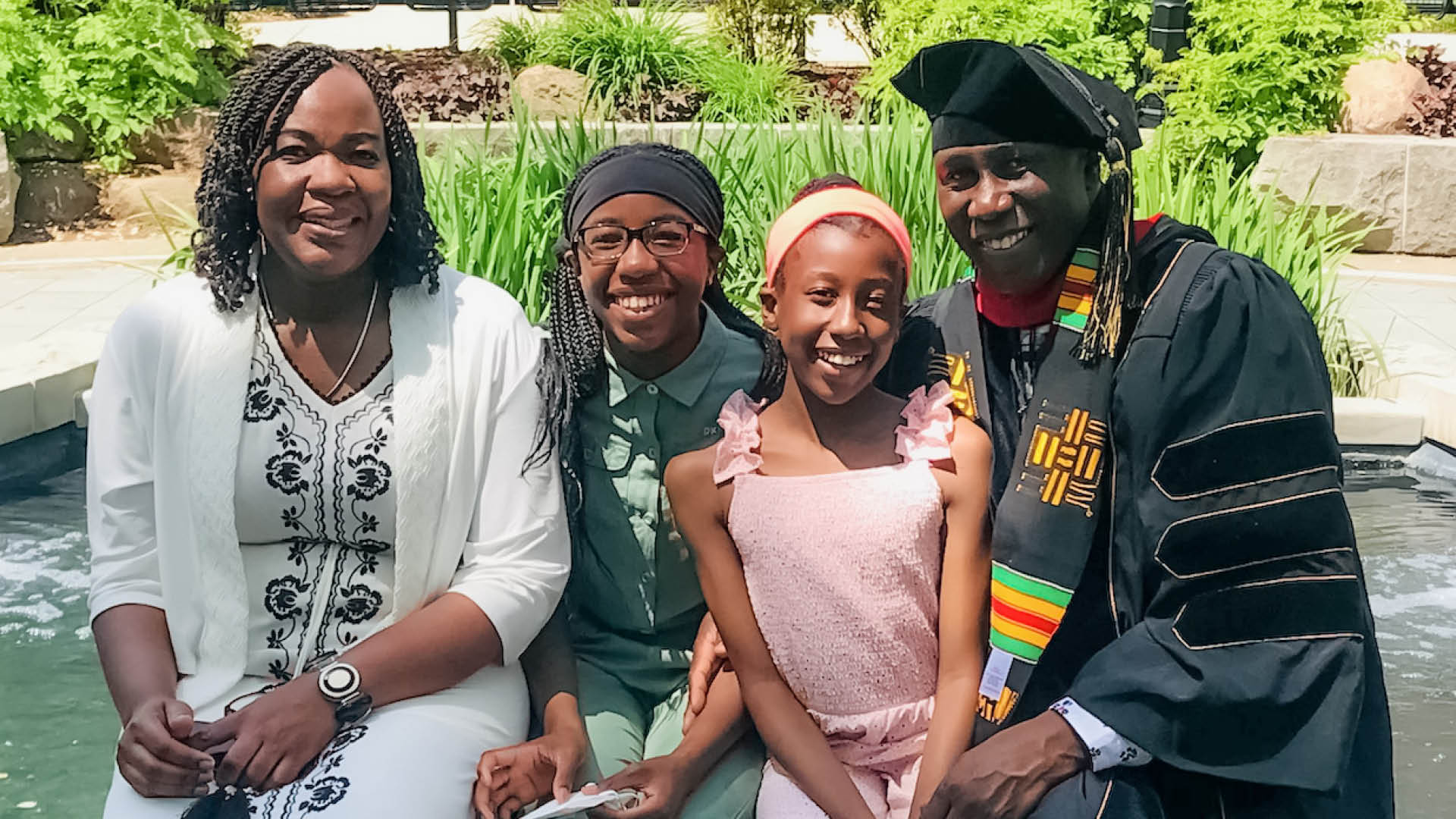
Nixon Opondo attended the Purdue commencement ceremony in West Lafayette with his wife and children, who he credits with supporting him during his studies. (Photo courtesy of Purdue University Online)
Doctoral degree provides both professional and personal fulfillment
When Nixon Opondo, a quality and process engineer at Boeing, arrived in West Lafayette to walk in his graduation ceremony and receive his Doctor of Technology degree from Purdue University Online, he expected the experience to be unforgettable. It was the first time Opondo, who had completed his doctoral degree entirely online, would see his new alma mater in person.
“I wouldn’t have missed that opportunity for the world,” Opondo said.
What he didn’t expect was that he would receive a standing ovation after walking across the graduation stage. The reason for the ovation: Opondo was the only person in the ceremony receiving a Doctor of Technology degree.
To Opondo, however, graduating from Purdue represented more than a personal achievement; it was also an opportunity for him to bring much needed knowledge and skills back to his hometown, where his expertise could have a major impact. He grew up in a small village called West Alego, Kaugagi, in the Siaya district of western Kenya.
“My mother passed away when I was 13 years old,” Opondo said. “And my father moved us to a boarding school in the countryside. But I spent part of my youth in my home village. I always wanted to help the people in my home village, as well as others who were struggling in life.”
His doctoral research, which focused on improving quality of life for people with lower-limb prosthesis devices, was inspired by his experience living in a remote community where disabled people often lack the resources they need.
“My research looked at the trends and advancements that are happening in prosthesis devices with the intent of predicting what’s on the horizon for prosthesis users as technology changes and develops,” Opondo said. “There are lots of changes that can be made in terms of rehabilitation and engineering, and I want to do something about it — that’s a commitment that I have.”
Opondo’s goal of improving quality of life for prosthesis users is also informed by his personal experience. While completing his doctoral studies, Opondo learned that he had a serious medical condition that would require him to wear a prosthetic device himself. Though Opondo never considered that he would be a prosthetic user when he began his graduate research, he said the experience gave him a better perspective on the accommodations prosthetic users need to live full lives.
“When Nixon discovered midway through his doctoral program that he had developed a serious health issue, he became concerned that the dream of a doctorate from a prestigious university might be beyond his reach,” said Linda Naimi, associate professor of technology leadership and innovation and the faculty lead for the Doctor of Technology program. “However, Nixon does not give up easily, nor do I. We discussed various options. He decided to put all his efforts into completing his degree before undergoing the medical treatments his doctors were recommending.”
Despite significant challenges, Opondo achieved his goal of graduating from Purdue, and he plans to use his experience as a new prosthesis user to inform his future research, which he hopes will change lives and make the world easier to navigate for disabled people — especially for those in western Kenya.
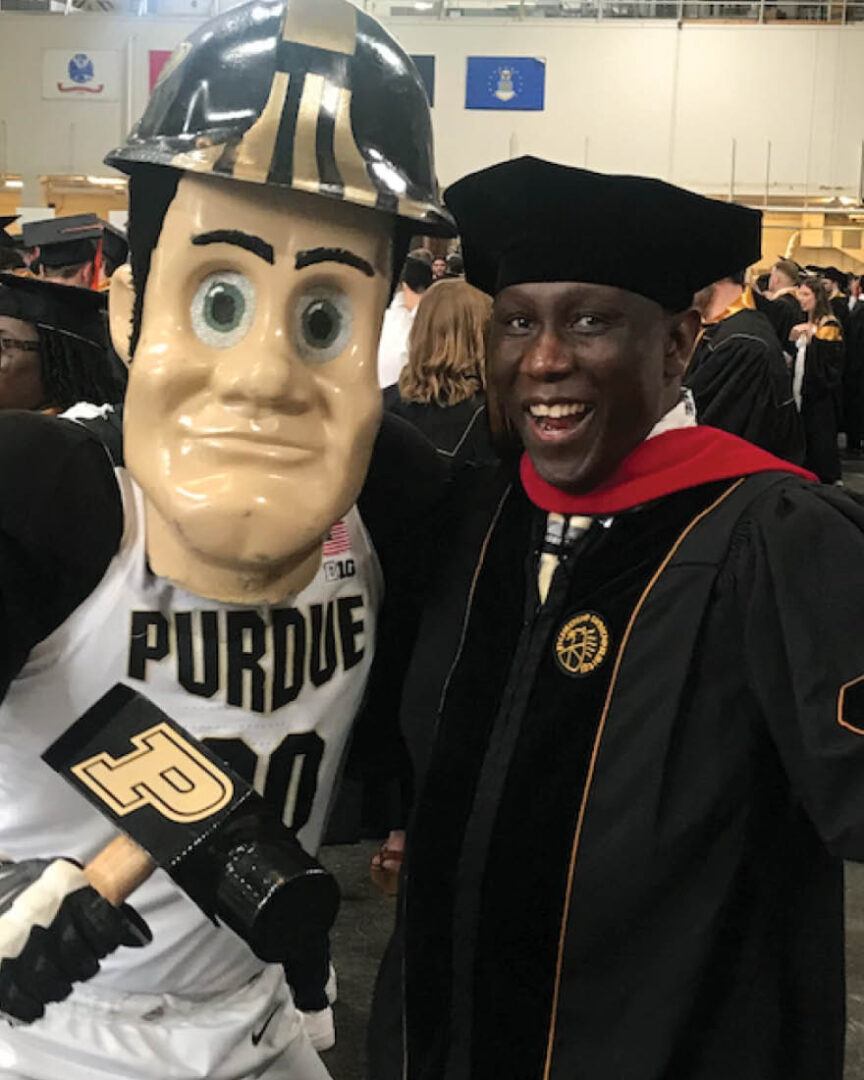
Becoming a Boilermaker
Opondo’s graduation from Purdue was the culmination of many years of professional experience, research and passion. He began his technical career as a licensed aircraft and power plant mechanic before moving into an engineering role with Boeing. No stranger to higher education, Opondo already held several degrees before coming to Purdue: a bachelor’s degree in aviation technology, a master’s degree in industrial technology management, a master’s degree in international business administration and a Doctor of Business Administration in quality systems management from the Graduate School of Quality Management, a technical institution that dissolved shortly after Opondo graduated.
“I think seeing my previous graduate institution close hurt the credibility of my degree,” Opondo said. “I needed to be connected to an institution that could provide continuous support and a good name, as well as an extensive professional network so I could pursue my goals. Purdue was that for me.”
Opondo started working at Boeing after completing his initial graduate studies. There, he found that his professional aspirations were outpacing his present skill set. Boeing is a technology-focused enterprise, and Opondo knew that increasing his tech skills and engineering expertise could position him for advancement, especially if he pursued a degree at a well-respected, technology-focused institution like Purdue.
“I wanted to grow into the future, grow in the direction that my organization was growing,” Opondo said. “To do that, I had to go back to school.”
In Purdue’s Doctor of Technology program, Opondo found many new opportunities to grow his skill set and study pressing issues in engineering and technology. He also found the stability and legitimacy he felt his previous doctoral institution was lacking.
“Purdue restored my pride,” Opondo said. “If anybody asks me, ‘Where did you go to get your doctoral degree?,’ I can confidently and proudly say Purdue.”
An engaging online learning experience
Opondo’s goal of earning another doctoral degree was supported by Boeing. The company offered him a tuition supplement that covered many of the costs associated with the program. As a student in the 100% online Doctor of Technology program, Opondo was able to continue working at Boeing while completing his degree. And though Opondo was working on a tight schedule and studying many miles away from Purdue’s flagship campus in West Lafayette, Indiana, he still felt fundamentally connected to the campus community.
The level of support I received as an online student was unlike anything I have ever experienced in my life.
Nixon Opondo
DTech ’21
“It was an online program, but there was absolute engagement throughout the process,” Opondo said. “The level of support I received as an online student was unlike anything I have ever experienced in my life.”
Opondo was particularly grateful for the program’s expert faculty, who went above and beyond in supporting him with his research goals and giving him the resources he needed to succeed. Naimi provided extensive help and support to Opondo — advising, guiding, encouraging and showing him the ropes — so he could complete his projects with confidence.
“Nixon proved to be an outstanding doctoral student whose integrity and diligence impressed me from the beginning,” Naimi said. “His courage and determination garnered the support of his doctoral committee and Purdue administrators and staff, and we watched his graduation and the standing ovation he received with absolute joy.”
Other students in the Doctor of Technology program also helped steer Opondo toward success. Though he never met most of his classmates in person, the structure of the program allowed him to participate in many group projects, where he was able to bond with his colleagues and learn from their diverse experiences and industry expertise.
“I was able to work with people from many different backgrounds who had all kinds of experiences,” Opondo said. “Even though we weren’t on campus, classes felt very immersive — the opportunities, the courses and the projects are all the same as attending on-campus — and if I needed to call someone to get help with an assignment or my research, I could do that with no problem.”
Learning to make an impact
Receiving a doctorate from Purdue was a major accomplishment for Opondo and a point of pride for his family, which is spread all over the world. Opondo credits his wife and children for supporting him while he was conducting research and working toward completing his degree. And though most of his family members were unable to attend his graduation in person, Purdue’s graduation livestream allowed them to see, in real time, Opondo receiving his degree and getting a standing ovation from the audience.
“It was an incredible moment,” Opondo said. “It was a very professional ceremony, and Purdue provided everything you could possibly imagine. There were people across the world who were able to share that moment with me.”
Now that Opondo has graduated from Purdue, he’s looking toward the future. He expects that his Doctor of Technology degree will open many doors in his professional life, and he’s looking for more leadership opportunities at Boeing. He is also a part-time college professor. He teaches a class on international technology management at the University of Central Missouri, where he completed his bachelor’s and master’s degrees. To Opondo, teaching is a way of sharing the expertise he’s amassed with others and inspiring more young students to pursue higher education and make an impact in their chosen fields.
“My main goal is to advance people’s knowledge using what I’ve learned,” Opondo said. “I had access to all these wonderful resources at Purdue, and I want to share that with others.”
Opondo is still recovering from his prosthesis implant, but after he heals, he plans to hit the ground running — using what he learned in his doctoral program to progress in his career and using his new experience as a prosthesis user to strengthen his research. He thinks often about how he can give back to the community he grew up in and similar communities across the globe.
“What kind of impact can I make with the knowledge I have?” Opondo said. “That is the question I always ask.”
Written by: Rachel Barton, barton53@purdue.edu
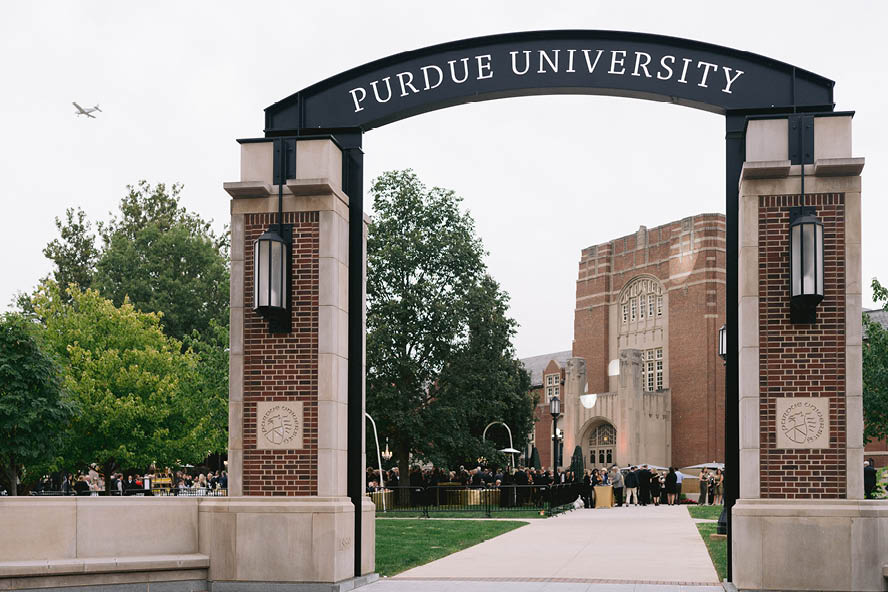
I had access to all these wonderful resources at Purdue, and I want to share that with others.
Nixon Opondo DTech ’21
